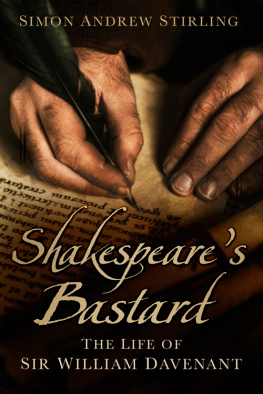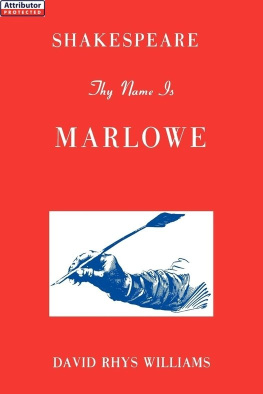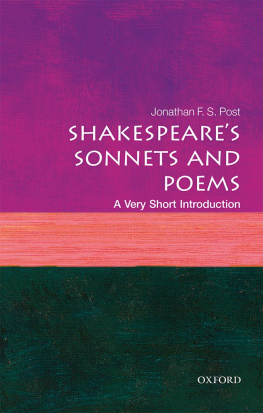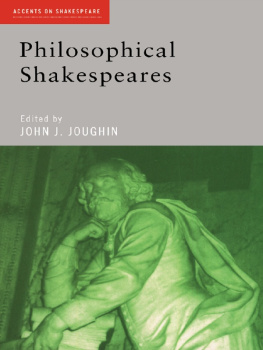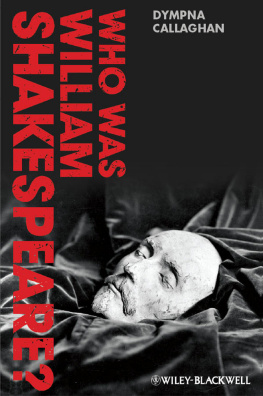
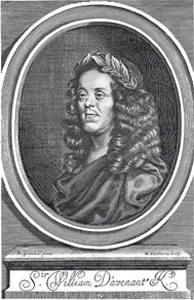
William Faithornes engraving of Sir William Davenant (1673).
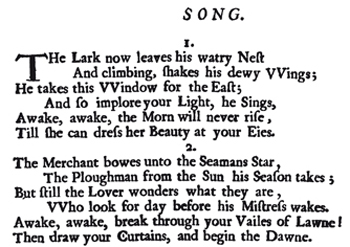
Davenants most anthologised poem, from The Works of Sr William Davenant Kt (1673).
An ART & WILL Book
To Kim ,
eudail de mhnathan an domhain
I would like to thank the following: the Rector and Fellows of Lincoln College, Oxford; my colleagues and students at the University of Worcester; Keith Barnes; Mike Jones at Rare Old Prints; Julian Smith at The White Bear; the vicar and churchwardens at St Leonards, Beoley; Jacqueline Rattray and Johanna Franklin at Goldsmiths; Richard Peach; Steve and Julie Wadlow; the late Michael (Lord) Birkett; Lee Durkee; Dr Joanne Paul; Ceilidh Lerwick; Dr Alan Ogden; Anna Davies; Shana and Sid; Al Petrie; my parents, Norman and Brenda, for the books; Janet and John Ford at Tudor World, Stratford-upon-Avon, for helping to fund the research; the Historical Honeys; Rebecca Rideal; my editors, Mark Beynon and Juanita Zo Hall, and the team at The History Press; and, as ever, Kim and Kiri.
Contents
On 26 February 1936, members of the Davenant Society gathered to celebrate the 330th anniversary of the birth of Sir William Davenant. They met in the recently restored Painted Chamber, in what had been the tavern run by Davenants parents, where they were treated to an informal address by Edgar Cardew Marchant, sub-rector of Lincoln College.
Marchant observed that Davenants was indeed a career of strange vicissitudes, of many ups and downs, mainly downs: and shows him to have been a man of unlimited resource, undaunted courage, and unruffled good temper. When one has read the account of his life, one does not know whether to guffaw with laughter or to weep; so grotesque is it, yet so pathetic. But on the subject of Davenants paternity, he was in no doubt:
The story that William Davenant was the illegitimate son of Shakespeare has no basis of fact. Scott in his Woodstock jests upon this possibility, but Scott was too good an antiquarian seriously to have accepted such a story. The only original authority is Aubrey, who almost certainly wrote the story when he was drunk. I hope the society will dismiss it from their minds.
E.C. Marchants informal address was hardly a model of accuracy. In almost the same breath as his blunt dismissal of the son of Shakespeare story he argued that the apostrophe in Davenants name DAvenant was a fancy of his third wife, Lady Davenant, who was a Frenchwoman; it was used by him only in the later part of his life. In fact, Davenant was using the apostrophe a good quarter of a century before his third marriage. Marchant was also strangely ill-disposed towards much of Davenants work I cannot carry in my mind the plot of any one of Davenants plays; the epic [ Gondibert ] as a whole is completely unreadable; to the last years of Davenants life belong the deplorable adaptations of Shakespeare and managed to get the date of Ben Jonsons death wrong.
Marchant was senior honorary member of the Davenant Society and sub-rector of Davenants old Oxford college. And yet he could not bring himself to remember the plots of Davenants plays or to give credit where it was due. With friends like that, one might think, Davenant had no need of enemies.
No evidence of any kind was adduced to support Marchants contention that the story that William Davenant was the illegitimate son of Shakespeare has no basis of fact. No evidence was given because none had been looked for. The most compelling question about Davenant was he, as he apparently claimed to have been, the illegitimate son of Shakespeare? was repudiated on no grounds whatsoever: I hope the society will dismiss it from their minds.
It had not always been so. During his lifetime, and in the years that followed, Davenants relationship with Shakespeare was much talked about. Reputable figures many with connections to Davenants Oxford accepted that Sir William had probably been the product of an illicit liaison between the Bard of Avon and the buxom mistress of the Taverne. Then it became streng verboten to consider the possibility that Davenant was Shakespeares son. Not that any evidence had come to light to quash the rumours. Academic intolerance demanded that the story be rejected out of hand.
I became interested in Sir William Davenant while working on Who Killed William Shakespeare? The Murderer, The Motive, The Means (The History Press, 2013) and soon discovered that I liked him. He was undoubtedly brave, resourceful, industrious and loyal. Moreover, biographies of Davenant are few and far between. Bearing in mind his status as Englands second poet laureate, his role in the English Civil War and his theatrical innovations, it seemed that he had been unjustly overlooked by biographers. I guessed that the main reason for this neglect was the awkward matter of his paternity, since any biographer would have to broach the subject, and this would require either a blanket denial (without evidence) or a serious engagement with the story, which might be detrimental to ones career prospects. Best to leave well alone.
But Davenant deserves to be taken seriously, as does the question was he Shakespeares son? This book is an attempt to answer that question. To avoid a biography that feels too front-loaded the most pertinent part being the very start of his life I resolved to arrange it backwards. Thus, Part One (Restoration) recounts Davenants final years, after the return of King Charles II. The second part (Revolution) covers Davenants activities immediately before, during and after the Civil War. Part Three (A Young Man in London) explores the beginnings of Davenants theatrical career, while Part Four (A Child in Oxford) concentrates on the links between the young Davenant, and his parents, and William Shakespeare, working towards the final section (1605) in which the extraordinary love affair between Shakespeare and Davenants mother is revealed.
Much of the book grew out of, and builds upon, my research for Who Killed William Shakespeare? There have been developments since that book was written: Steve Wadlow introduced me to his remarkable portrait, which I believe to be of Shakespeare; Goldsmiths, University of London, published my paper on The Faces of Shakespeare; and at the time of writing moves are underway, led by a team from the University of Staffordshire, in conjunction with a Channel 4 documentary, to determine whether or not the Beoley skull is indeed the veritable skull of William Shakespeare. Some of the information presented in Who Killed William Shakespeare? has been duly revised. For example, I previously claimed that Shakespeare had dallied with Jane Sheppard-Davenant at Banwell in Somerset; further research has convinced me that I was wrong, and that the ShakespeareJaneSouthampton love triangle actually unfolded on the outskirts of Bristol.
Wherever possible I have quoted from the earliest available written source or publication (the main exceptions to this rule being Samuel Pepyss Diary and John Aubreys Brief Lives , the originals of which are too idiosyncratic to be readily comprehensible) but I have amended the typography, standardising the uses of u and v and avoiding the long s which can make wise look like wife , and so on.
With the 400th anniversary of Shakespeares death upon us, the time has come for a reassessment of the life and achievements of the man who liked to be thought of as Shakespeares bastard: Sir William Davenant, poet laureate and Civil War hero.
Next page
